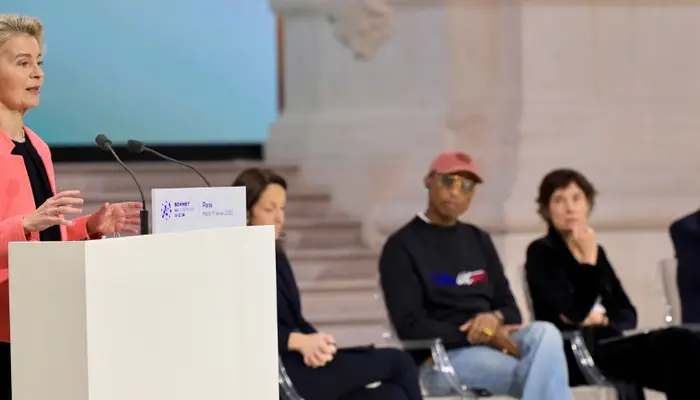
The European Union will invest €50 billion to accelerate AI innovation, aiming to strengthen its position in the global AI race. Commission President Ursula von der Leyen announced this initiative as part of the InvestAI program during the AI Action Summit in Paris. The keyword “AI innovation” underscores Europe’s push to lead in trustworthy AI development.
Public-Private Partnership to Mobilize Funds
The €50 billion EU investment will supplement a €150 billion private-sector pledge under the EU AI Champions Initiative. This creates a €200 billion funding pool over five years to support AI research and development. Von der Leyen described it as the world’s largest public-private partnership for AI, focusing on industrial and mission-critical applications.
Read: US Inflation Rises Unexpectedly to 3% in January
AI Gigafactories to Train Large Models
A major part of the plan is a €20 billion fund to establish four AI gigafactories. Each facility will house 100,000 advanced AI chips to train large AI models. The EU has already invested €10 billion in upgrading supercomputers for AI model development. Von der Leyen emphasized that these resources will give companies, including start-ups, access to powerful computing without relying on financial strength.
European AI Research Council Vision
The EU aims to establish a European AI Research Council, modeled after CERN in Geneva, to bring together researchers, entrepreneurs, and investors. “We want to create an ecosystem where talents collaborate across industries and borders,” von der Leyen said. The gigafactories will serve as the foundation for this vision.
Flexible Funding Model
InvestAI will use a layered funding approach, with different risk and return profiles to attract private investment. Initial EU contributions will come from programs like the Digital Europe Programme, Horizon Europe, and InvestEU, while member states can contribute through Cohesion funds. The EU will offer grants and equity funding to de-risk private investments.
Industry Reactions
DigitalEurope welcomed the initiative but called for more public funding in the EU’s 2028 budget. However, others, like Bálint Pataki from the Centre for Future Generations, see the current plan as sufficient to secure Europe’s place in global AI development. He praised the gigafactories, calling them essential for creating trustworthy AI.
Global Competition Intensifies
Europe’s move comes in response to the US Stargate initiative, which aims to mobilize $500 billion in AI investment, and China’s AI advancements, led by DeepSeek’s R1 model. Von der Leyen highlighted the ongoing race, noting that “global leadership is still up for grabs.”
Europe’s Strength in AI
Von der Leyen stressed that Europe’s competitive edge lies in its science and industrial data expertise. The EU’s AI strategy emphasizes cooperation, open-source development, and safety—areas where it hopes to lead.
Pataki noted that Europe’s focus on trustworthy AI could be a differentiator. “We should focus on the AI of tomorrow, not yesterday,” he said, referencing ChatGPT as an example of an outdated goal.
Regulatory and Investment Balance
The EU’s regulatory approach has drawn criticism. Some argue that rules like the AI Act and GDPR make Europe less attractive to investors. Von der Leyen defended the AI Act, saying it streamlines safety regulations across member states, but also pledged to reduce bureaucracy.
The AI Action Summit also featured French President Emmanuel Macron, who announced €109 billion in AI investments for France. He promised global AI developers abundant electricity and coined the slogan “plug, baby, plug” to promote France’s AI infrastructure.
Follow us on Google News, Instagram, YouTube, Facebook,Whats App, and TikTok for latest updates












